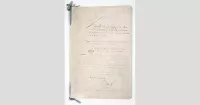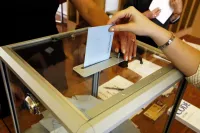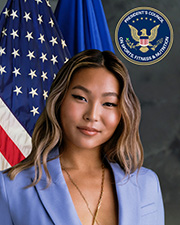Elections in New Zealand are a key aspect of its representative democracy, where members of Parliament are elected. General elections occur roughly every three years, though the prime minister can call for an earlier election in specific situations. By-elections are held to fill electorate vacancies that arise during a parliamentary term. Election day is always on a Saturday, but advance voting is permitted beforehand. The most recent general election was held on October 14, 2023.
1917: Original date of postponed election
Due to World War I, the election that would have occurred in 1917 was postponed until 1919.
1919: Election delayed due to World War I
The 1919 election was delayed due to World War I; it would otherwise have taken place in 1917.
1934: Original date of postponed election
Due to the Great Depression, the election that would have occurred in 1934 was postponed until 1935.
1935: Election delayed due to the Great Depression
The 1935 election was delayed due to the Great Depression; it would otherwise have taken place in 1934.
1941: Original date of postponed election
Due to World War II, the election that would have occurred in 1941 was postponed until 1943.
1943: Election delayed due to World War II
The 1943 election was delayed due to World War II; it would otherwise have taken place in 1941.
1950: Legal requirement to hold elections on a Saturday introduced
In 1950, the legal requirement to hold elections on a Saturday was introduced in New Zealand, and this first applied to the 1951 election.
1951: First election held on a Saturday
In 1951, New Zealand held its first election on a Saturday, due to the introduction of a legal requirement in 1950.
1951: Saturday election day for Māori and general seats
Since 1951, election day for both Māori and general seats has been held on a Saturday in New Zealand.
1957: Convention formed to hold elections on the last Saturday of November
Beginning with the 1957 election, a convention was formed to hold general elections on the last Saturday of November in New Zealand.
1984: Muldoon calls a snap election
In 1984, Muldoon called a snap election, upsetting the convention to hold elections on the last Saturday of November.
1986: Constitution Act 1986
The Constitution Act 1986 requires new parliamentary elections every three years.
1986: The Constitution Act 1986 related to parliament
The term of Parliament and the timing of general elections is set out in the Constitution Act 1986.
1993: Electoral referendum
In 1993, an electoral referendum was held which led to the introduction of the mixed-member proportional (MMP) system.
1993: Introduction of MMP voting system
In 1993, the mixed-member proportional (MMP) voting system was introduced in New Zealand. This was the most significant change to the electoral system in the 20th century and has led to mostly minority or coalition governments.
1993: The Electoral Act 1993 related to parliament
The term of Parliament and the timing of general elections is set out in the Electoral Act 1993.
1996: First election under the MMP system
In 1996, New Zealand held its first election under the mixed-member proportional (MMP) system, following the 1993 electoral referendum.
1996: Televised Leaders' Debates Include All Parties
In 1996, New Zealand's televised leaders' debates expanded to include leaders of all parties with parliamentary representation, moving beyond the traditional format of only featuring the two major parties.
1996: Early election
The 1996 election took place slightly early (on 12 October) to avoid holding a by-election after the resignation of Michael Laws.
1999: Return towards the election convention
In 1999, New Zealand started to return towards the convention of holding elections on the last Saturday of November.
1999: Impact of special votes
In 1999, the provisional result indicated that neither the Greens nor New Zealand First would qualify for Parliament, but both parties qualified on the strength of special votes, and the major parties ended up with fewer list seats than expected.
2001: Local Electoral Act 2001
Under section 10 of the Local Electoral Act 2001, elections must be held on the "second Saturday in October in every third year" from the date the Act came into effect.
2002: United Future Party's Debate Boost
During the 2002 election, the United Future party experienced a boost in opinion polls following their party leader's successful performance in a televised debate.
2002: Clark calls an early election
In 2002, Helen Clark called an early election, disrupting the efforts to return to the conventional election date.
2005: Election after the 2002 snap election
In 2005, New Zealand had an election after the 2002 snap election.
2008: Voter satisfaction with waiting time
According to a 2008 survey commissioned by the Electoral Commission, 71% of voters voted in less than 5 minutes and 92% in less than 10 minutes, and 98% of voters are satisfied with the waiting time.
2008: Election after the 2002 snap election
In 2008, New Zealand had an election after the 2002 snap election.
2011: Lowest voter turnout since 1893
At the 2011 election, turnout as a percentage of those eligible to enrol dropped to 69.57 per cent, the lowest recorded at a New Zealand Parliamentary election since the adoption of universal suffrage in 1893.
2011: Conventional "last Saturday of November" achieved again
By the 2011 election, the conventional "last Saturday of November" was achieved again in New Zealand.
2011: Advance voting available for any reason
From 2011 and beyond, voters could use advance voting service for any reason in New Zealand.
2014: Trend towards September or October elections
From the 2014 election, the trend has been to hold the election in September or October in New Zealand.
2014: Electoral Commission report after the 2014 election
In its report after the 2014 election, the Electoral Commission stated...
2014: Advance voting in the election
In the 2014 election, 24% of the votes were taken in advance.
2014: Second-lowest voter turnout
The 2014 result, 72.14 per cent, is the second lowest voter turnout in New Zealand elections since 1893. The Electoral Commission described New Zealand as having a serious problem with declining voter participation.
2017: Increased use of advance voting
A dominating feature of the 2017 election was the increased use of advance voting; 47% of the votes were taken in advance.
2017: Electorate adjustments after the 2017 election
Compared to the 2017 election, the number of electorates increased by one to account for the North Island's higher population growth, creating Takanini; and the boundaries of 30 general electorates and five Māori electorates were adjusted.
2017: Electoral Commission report on roll sales
In their report on the 2017 general election, the Electoral Commission recommended that roll sales be discontinued for anything other than electoral purposes, due to concerns about the misuse of electoral roll information.
2017: "Orange Guy" used in advertising
Since 2017, "Orange Guy" has been the mascot used in electoral related advertising by the Electoral Commission. He is an amorphous orange blob and has been voiced by stand-up comedian David Correos.
2018: More people vote in advance
In 2018, the Northcote by-election was the first parliamentary election where more people voted in advance than on election day.
2020: Labour Party wins outright majority
In 2020, the Labour Party, led by Jacinda Ardern, won an outright majority in New Zealand. This was the first time a party had won an outright majority since the introduction of the MMP voting system.
2020: Increase in advance voting due to COVID-19
In the 2020 election, 68% of votes were cast in advance - an increase of about 60% compared to the previous general election, likely driven by the COVID-19 pandemic's impact on people's ability to vote in person.
2020: Voting booths in hospitals and rest homes
In the 2020 election, voting booths were not set up in hospitals and rest homes for use by patients because of the COVID-19 pandemic in New Zealand.
2020: "Orange Guy" joined by a dog
In the 2020 general election campaign, "Orange Guy" was joined by a dog, Pup, who is also orange and resembles a cross between a Jack Russell Terrier and a Dachshund.
2020: Electorates since the 2020 general election
Since the 2020 general election, there are 72 electorates in New Zealand, including seven Māori electorates.
2020: Election delayed due to COVID-19 pandemic
The 2020 election was delayed from September to October due to the COVID-19 pandemic in New Zealand.
October 2022: Latest local body elections
On 8 October 2022, the latest local body elections were held in New Zealand.
2022: Local elections and use of STV system
In 2022, local elections were held in New Zealand, with 15 councils using the single transferable vote (STV) system. The STV system has been increasingly adopted by councils since the 2000s.
October 2023: Most recent general election
In October 2023, New Zealand held its most recent general election. These elections in New Zealand, a representative democracy with a unicameral parliament, are usually held every three years.
2023: Recounts requested in electorates
At the 2023 election, recounts were requested in the Mount Albert and Tāmaki Makaurau electorates, after the top two candidates in each were separated by fewer than 50 votes.
2023: Election held in October
The 2023 election was held in October in New Zealand, caused by the 2020 election also being held in October.
Mentioned in this timeline

Jacinda Ardern served as the th Prime Minister of New...
New Zealand is an island country located in the southwestern...

War is defined as an armed conflict involving the organized...

A constitution serves as the foundational legal document for any...

An election is a structured decision-making process where a population...

September is the ninth month of the year in the...
Trending

Ray Lewis is a former American professional football linebacker renowned for his -year career with the Baltimore Ravens A standout...

9 months ago Caitlin Clark, Serena Williams at NFL Meeting; Flag Football for LA28.

2 months ago Laura Rutledge and Tim Tebow Pay Off a Lost Bet on SEC Nation.
5 months ago Liberty University Announces Track & Field Tryouts and Softball Academic Honors

7 months ago Myles Garrett Victorious: Outpaces Girlfriend Chloe Kim in Thrilling Race

3 months ago Seth Moulton Challenges Ed Markey for Massachusetts Senate Seat in Generational Fight
Popular

Stranger Things created by the Duffer Brothers is a popular...

XXXTentacion born Jahseh Dwayne Ricardo Onfroy was a controversial yet...

Kelsey Grammer is an accomplished American actor producer and singer...

Marco Rubio is an American politician attorney and diplomat He...

Candace Owens is an American conservative political commentator and author...

Bernie Sanders is a prominent American politician currently serving as...